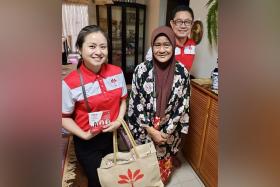Civil service 'must not be politicised'
Former head of civil service Peter Ho stresses its impartiality and says it cannot be politicised
Civil servants need to keep political leaders at arm's length and must never make use of their relationship with them, said former top civil servant Peter Ho.
This separation is critical because "the day the civil service gets politicised, we have a problem", he said in an interview with The Straits Times yesterday.
"I would discourage my civil servants from capitalising on relationships. I never allowed myself to," said Mr Ho.
This is especially important as many senior civil servants might have gone to school with political leaders, noted the University of Cambridge alumnus, who headed the civil service from 2005 until his retirement in 2010.
His book on governance will be launched tomorrow.
The civil service today is impartial, he stressed.
"I will not assume that observations - which are made from time to time - of politicisation of the civil service are either fair or an accurate description," he said, responding to perceptions from some quarters that the civil service is politicised.
Specifically, the Workers' Party (WP) had accused the National Development Ministry of bias in issuing regular statements on alleged misconduct by the WP-run town council during the 2015 General Election, but not after Polling Day on Sept 11.
There are also long-standing grumbles that the People's Association helps the ruling People's Action Party mobilise the ground.
Amid such talk, Mr Ho's advice to civil servants is: "You have to keep your nose clean, otherwise you will open yourself up precisely to these kinds of accusations that you are being politicised or you're being influenced by the political leadership."
The 63-year-old was speaking ahead of the launch of his book, The Challenges Of Governance In A Complex World. It consists of the four lectures he gave this year as the Institute of Policy Studies' S R Nathan Fellow for the Study of Singapore.
In his lectures, Mr Ho - now a senior adviser in the Centre for Strategic Futures - spoke about the need for governments to be prepared for unexpected trends or events.
After one lecture, an audience member asked: What if one unexpected event is the fall of the PAP?
Asked to elaborate yesterday, Mr Ho said with a laugh: "You cannot rule this kind of scenario out."
INSTINCTIVE UNDERSTANDING
The civil service and the PAP have worked together for so long that they have developed an "instinctive understanding" of each other.
"Is this good? Is this bad? I don't know. But there are a lot of advantages when the civil service instinctively understands the thinking of the political leadership and vice versa," said the former permanent secretary at the Foreign Affairs and Defence ministries.
But officials must maintain a professional position of being able to offer objective independent advice to ministers.
Mr Ho himself has a thick hide from being "chewed out so many times" by ministers in his 34 years in the public sector. Such disagreements are par for the course, he said.
"From time to time we do have to tell the ministers basically this is a dumb idea."
He did not give examples, but said ministers would not ignore such advice given to them in a "reasonably compelling way".
Mr Ho also gave his take on how governance evolved with the times, and said the Government must learn to listen more to the people.
"They are very well informed and do their homework, and they sometimes pick up on things which governments don't pick up on," he said.
Get The New Paper on your phone with the free TNP app. Download from the Apple App Store or Google Play Store now


